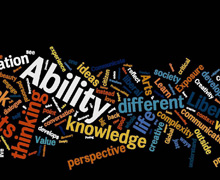By James Tonkowich | A dear friend’s daughter just graduated from a small, highly respected liberal arts college with her Bachelor of Arts in psychology “with all the honors, rights, and privileges to that degree appertaining.” What precisely those honors, rights and privileges are and whether they’re worth the price are subject to debate.
While almost no one pays the sticker price, next year tuition, room, board and fees at her alma mater is $58,950. If the price doesn’t increase — an unlikely prospect — a four-year undergraduate degree costs a whopping $235,800, plus books, supplies, athletic equipment, spending money, transportation, clothes and assorted other items.
It’s small wonder that Americans are beginning to wonder whether spending four years and a quarter of a million dollars is worth it particularly when so many graduate drowning in debt with an imprimatur that may be nearly worthless.
Writing in the Wall Street Journal, Kirk McDonald, president of the high tech company PubMatic, tells graduates: “I run a cool growing company in the digital field, where the work is interesting and rewarding. But I’ve got to be honest about some unfortunate news: I’m probably not going to hire you.”
It’s not that PubMatic isn’t hiring. They are. “The problem,” McDonald writes, “is that the right skills are very hard to find. And I’m sorry to say it, dear graduates, but you probably don’t have them.”
McDonald goes on to advise every job seeker, “If you want to survive in this economy, you’d be well-advised to learn how to speak computer code.” And he goes on to assure grads, “There are plenty of services — some free and others affordable — that will set you on your way.”
Those services, it goes without saying, are online, which opens up the question of whether online education may not have been the better choice begin with. It sure would have been cheaper.
A paper by Vance H. Fried of the Heritage Foundation notes that a bachelor’s degree at the online-only Western Governors University (WGU) costs about $17,000 in tuition. Now that’s without the room and board, athletic facilities, libraries, student unions, frat parties and the rest of the “campus experience” that traditional colleges supply, but for many students and their families, numbers like that are irresistible.
So is online education the certain wave of the future? And if so, is it a good thing or a bad thing?
To answer, we need to ask: Why go to college in the first place?
For some, college is, as one wag put it, “four years percolating in a warm stew of beer, gender studies, and online pornography.” That is, the point of college is an extended adolescence of drinking and debauchery punctuated by junk courses. The current system suits them perfectly — until graduation when real life begins.
Others accept the premise that underlies much of the discussion about education: you go to college to launch a career. That is, college is a trade school. WGU, for example, offers degrees in teaching, business, information technology and healthcare. Liberal arts and humanities are sprinkled in, but the point is job training, not 19th-century English novelists.
My wife attended a non-degree nursing program and years later completed her B.S. in nursing. She has never visited her college (but they did charge her “student activity” fees). Her degree included online courses, video courses, extension courses and a few at community college. It was economical and fulfilled her career objectives. And there’s nothing wrong with job training, something that can easily be done at a distance.
But there’s a third approach to college, a liberal education.
Our son’s B.A. in liberal arts from Thomas Aquinas College had goals include wisdom, wonder, and virtue. The curriculum, taken by everyone, is the Great Books. The college is small (400 students), all classes are seminars, and the Christian faith is central to everything. You can’t reproduce that online; it requires presence.
It’s also not very interesting to most people. My wife — who has since earned a master’s degree — would not have survived the first year. She’s a nurse, not a philosopher. And there’s nothing wrong with that. It’s a question of what you want out of your education.
The cost of a traditional, residential college degree plus the softness of the job market for grads is forcing a shift in how education is delivered. Economical online distance learning is an education growth industry. Count on it and, if you’re planning on going to college, consider it.
At the same time, traditional residential schools will remain and that too is of enormous value. The economy may need information technology experts, but the world needs philosophers.
For this third party post in its full context, please go to:
http://www.religiontoday.com/columnists/james-tonkowich/arts-practical-arts-liberal.html


